I am trying to write a function that prints out a dictionary that shows the specific amount of values a combination of same-sided dice can possibly roll.
Example output for three 6-sided dice
input: 6,3
Desired output: {3: 1, 4: 3, 5: 6, 6: 10, 7: 15, 8: 21, 9: 25, 10: 27, 11: 27, 12: 25, 13: 21, 14: 15, 15: 10, 16: 6, 17: 3, 18: 1}
Example output for four 8-sided dice
input: 8,4
desired output: {4: 1, 5: 4, 6: 10, 7: 20, 8: 35, 9: 56, 10: 84, 11: 120, 12: 161, 13: 204, 14: 246, 15: 284, 16: 315, 17: 336, 18: 344, 19: 336, 20: 315, 21: 284, 22: 246, 23: 204, 24: 161, 25: 120, 26: 84, 27: 56, 28: 35, 29: 20, 30: 10, 31: 4, 32: 1}
Here is my function that creates an empty dictionary for each combination:
def dice_range(dice_type,dice_count):
dice_dict = {i+1:0 for i in range(dice_type*dice_count) if i+1 >= dice_count}
return dice_dict
input: dice_range(8,3)
actual output: {3: 0, 4: 0, 5: 0, 6: 0, 7: 0, 8: 0, 9: 0, 10: 0, 11: 0, 12: 0, 13: 0, 14: 0, 15: 0, 16: 0, 17: 0, 18: 0, 19: 0, 20: 0, 21: 0, 22: 0, 23: 0, 24: 0}
With that I am able to figure out how to solve for a specific number of dice_count of any dice_type(# of sides) Here is the solution for the first couple of examples:
dice_type = 6
dice_count = 3
temp = dice_range(dice_type,dice_count)
# for 3 dice of any number of sides
for x in range(1,dice_type+1):
for i in range(1,dice_type+1):
for j in range(1,dice_type+1):
for k,v in temp.items():
if x+i+j == k:
temp[k] +=1
dice_type = 8
dice_count = 4
temp = dice_range(dice_type,dice_count)
# for 4 dice of any number of sides
for y in range(1,dice_type+1):
for x in range(1,dice_type+1):
for i in range(1,dice_type+1):
for j in range(1,dice_type+1):
for k,v in temp.items():
if y+x+i+j == k:
temp[k] +=1
I hope that is enough context for the question.
Here is what I tried out, but for some reason the recursion is not working as I intended.
def dice_range(dice_type,dice_count):
dice_dict = {i+1:0 for i in range(dice_type*dice_count) if i+1 >= dice_count}
return dice_dict
def dice_value_calculator(dice_type,dice_count):
PREDICTION = dice_range(dice_type,dice_count)
# Tallies the number by 1 everytime it shows up in the loop.
def fill_dict(total):
for k in PREDICTION.keys():
if total == k:
PREDICTION[k] += 1
def loop(temp_dice_count,loop_total = 0):
for loop_i in range(1,(dice_type+1)):
# Base Case | if the number of dice(dice_count) reaches 0 that means it reached the end of the recursion
if temp_dice_count == 0:
fill_dict(loop_total)
print(PREDICTION)
loop_total = 0
# General Case / Recursive
else:
loop_total += loop_i
temp_dice_count -= 1
loop(temp_dice_count, loop_total)
loop(dice_count) # calls the loop function
return PREDICTION # returns the temp dictionary
print(dice_value_calculator(6,3))
This is the output I'm getting for three 6-sided dice
{3: 2, 4: 4, 5: 0, 6: 2, 7: 0, 8: 0, 9: 0, 10: 0, 11: 0, 12: 0, 13: 0, 14: 0, 15: 0, 16: 0, 17: 0, 18: 0}
Both the fill_dict() function and the dice_range() function work well on their own so it must be how I'm calling loop()
Any tips would be greatly appreciated. Please let me know if I need to clarify anything, this is my first time asking a question so I may have missed something.
Thanks in advance
